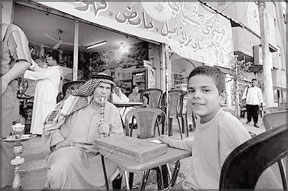Syria struggles with Iraqi influx
It is after midnight in a dimly lit square in the Damascus suburb of
Sayyida Zeinab.
by Andrew North
A bus rolls up, then another and another. Tired, bewildered faces
step out, sleeping children on their shoulders as they pull their few
belongings from the luggage holds below. They are Iraqi refugees.
Every night it is the same scene here. Some 2,000 arrive each day as
the exodus from Iraq continues, four years after the US and British
invasion.
At least 1.5m have come to Syria, more than to any other country in
the region. But what the United Nations calls the biggest refugee crisis
in Middle East since the flight of the Palestinians is still getting
little attention from the outside world.
Camp threat
With the massive loss of trained and educated people from Iraq, many
fear it could even further set back Iraq's chances.
And with no end in sight, the influx is already having serious
consequences for Syria. Its population has grown by nearly 10% because
of the refugees - the equivalent of six million people settling in the
UK in just a few years.

As Syrian authorities have so far allowed the refugees to live freely
rather than in camps, it has led to overcrowding in many parts of
Damascus.
Basic services like power, water and sewage are under severe strain.
Complaints are beginning to be heard from Syrians about the impact on
their already stretched economy.
Isolated because of its disagreements with the US, the authoritarian
government hoped it would win some international credit for looking
after the Iraqis - and more help.
It has not come, and with no end in sight the authorities have told
the BBC they are now having to tighten up. They may set up refugee camps
near the Iraqi border.
Dr Feisal Mekdad derides the help he says has been offered so far by
the US. "We hear they have donated $17m," he told the BBC. "But frankly
compared to what they are spending in Iraq this is pocket money."
So many have settled in Sayyida Zeinab, it is now known as Little
Baghdad. The main road is now called Iraqi Street, full of shops and
cafes catering to Iraqi tastes and with names like Fallujah restaurant
and Baghdad bakery.
Brain drain
There I met 14-year-old Saif, who fled southern Baghdad with his
family three years ago. He has not been to school since then.
This is one of the biggest concerns now, that so many refugee
children are not getting an education.
At the moment, he works in his father Yussuf's streetside cafe.
"I'd like all my children to be educated," he says. "But we can't
afford it. If Saif went to school, I'd have no-one here to help me."
A lucky few, the children of richer Iraqi families, do have
opportunities. We visited a private university set up by an Iraqi
businessman where more than half the students are Iraqis.
In the engineering department, Mohammed told me he planned to study
next in Europe for a master's degree. Eventually he wants to be an oil
engineer, "but not in Iraq", he says firmly.
It is all part of a catastrophic brain drain.
"Now the situation in Iraq is like that in 1970," says Professor
Hikmet al-Shaarbaf, the dean of medicine, who left a similar post in
Baghdad two years ago.
"All the educational progress made in the 1970s and 1980s has melted
away."
The UN's refugee agency (UNHCR) set up a new reception centre this
year to handle the growing numbers. Its existing office in the city
centre could not cope. But even with a large converted warehouse and
more staff, it is struggling.
When we visited, hundreds of people were waiting to get an
appointment for an interview.
All will be told they have to wait at least six months for their
claim for refugee status to be considered. But many Iraqis are not
applying, still hoping that they may eventually be able to return.
"The problem is that there doesn't seem to be an end to it," says
Lawrence Jolles, head of the UNHCR office in Damascus. "Neither the
refugees nor the authorities here know when it is going to stop."
In another part of Damascus, I met one recent arrival I know well.
Mohammed and I used to work together in Baghdad.
Two months ago, Shia militia took over his apartment building. If
they discovered he worked with foreigners, he was at extreme risk.
He had a good, well-paid job. He did not want to go. But he decided
he had no choice.
"At any time someone could come and kick in my door, kill me or
kidnap one of my kids.
"It was either my job or my life and my family's life."
However, like many Iraqis we met, he said so far he had seen no sign
of the sectarian tensions still tearing parts of Iraq apart.
"All Iraqis live here together," he says. "Shia, Sunni, even
Christians."
It is one sign of hope amid growing despair.
BBC |
